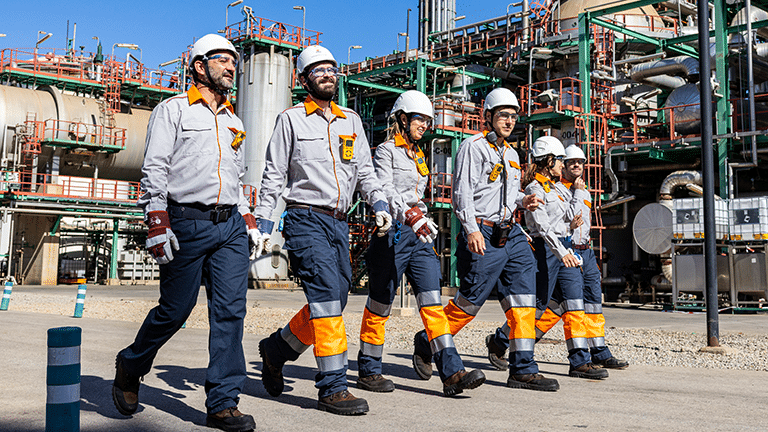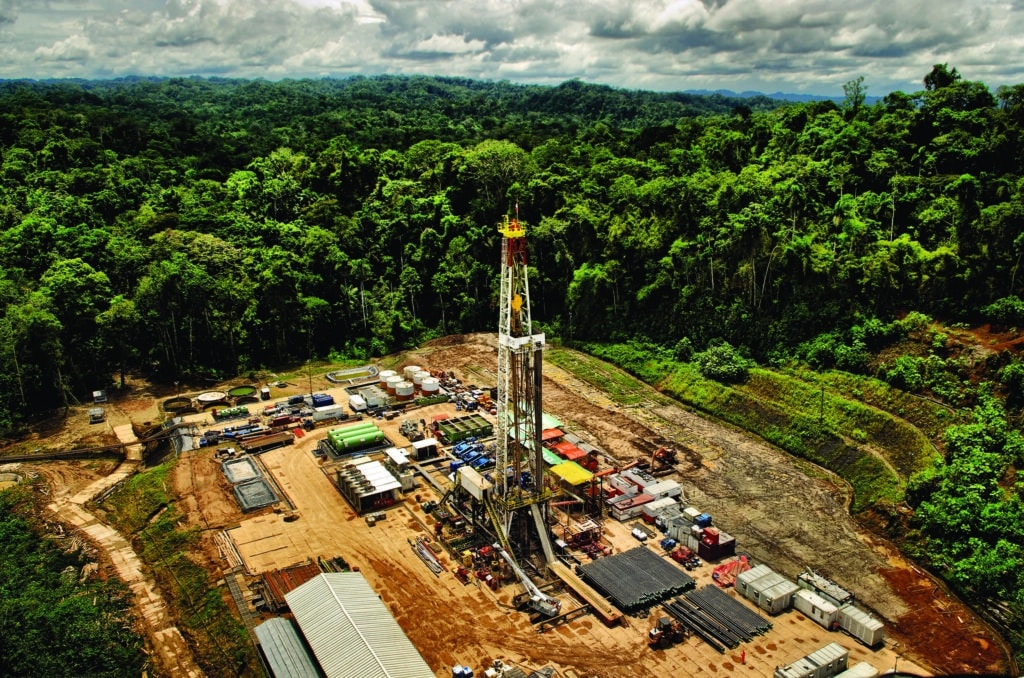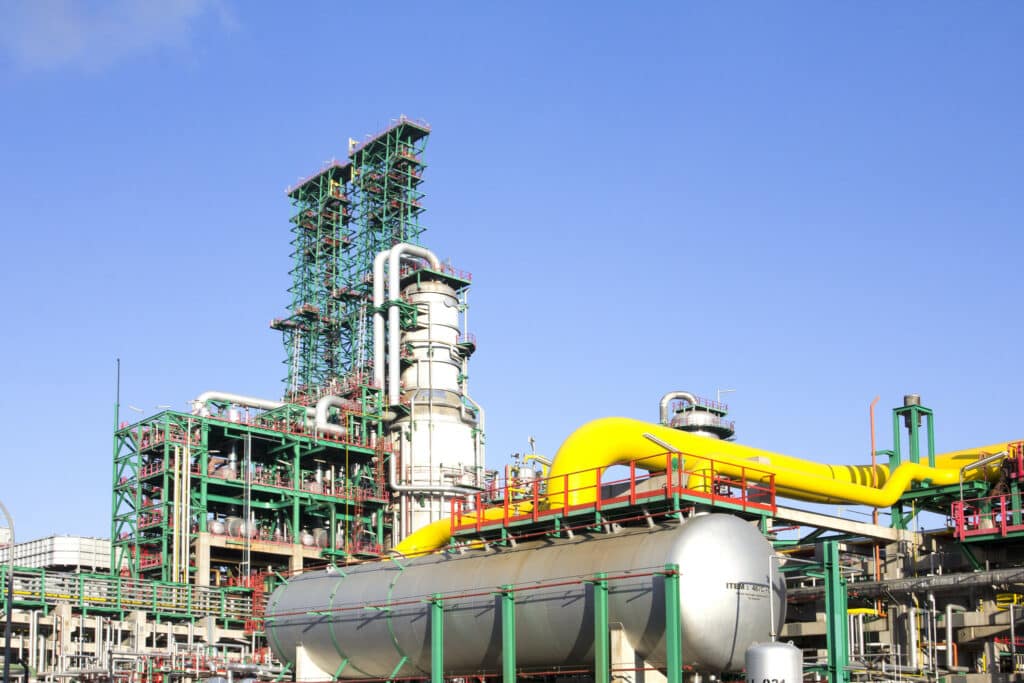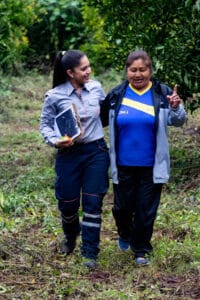Providing cleaner energy, empowering workers
Featured Members

In 2019, Repsol announced its ambition to achieve net zero emissions by 2050, becoming the first oil and gas company in the world to make such a goal. Alongside its new ambition, the company laid out a path to decarbonization in line with energy scenarios given in the Paris Agreement, starting with a goal of 40% reduction in its carbon intensity indicator by 2040.
Following faster and more effective transformations than first forecast, Repsol revised its goals in 2021 to be even more ambitious, upping its goal to 55% reduction of emission intensity by 2040.
As the company reshapes its operations for a low-carbon energy future, Repsol recognizes that the transition to cleaner energy holds both opportunities for growth and potential negative impacts. They are committed to finding solutions that minimize the social and economic impact of decarbonization on workers, local communities, and society as a whole — always based on respect for human rights, while paying special attention to the most vulnerable groups.
“The Just Transition concept is incorporated for the first time in the 2015 Paris Climate Agreement, which states that the parties must take action to combat climate change while considering human rights, the right to health, indigenous peoples, people in vulnerable situations, and equality and economic and social inclusiveness,” Repsol leadership shared in a written exchange with the Council. “On this basis, the energy sector must lead the energy transition towards a net zero emission’s system, considering its social and economic impacts on people, workers, and communities.”
Taking on the task, Repsol collaborated with the Council for Inclusive Capitalism and six other global energy-intensive companies in 2021 to develop the Just Transition Framework for Company Action to clarify actions that companies can take to ensure that their energy transition is just for workers, consumers, and communities. Sharing from its learned experience, Repsol contributed best practices for decarbonization, diversity and talent capacity, social development, and collaboration with sector peers and international initiatives.

Today, Repsol continues to align its steps toward a just transition to the Framework. The company is building a new business portfolio, creating jobs in low carbon activities, and investing in new energy sources and technologies that help reduce and neutralize emissions. In 2022, Repsol invested €4.182 billion to advance the transformation of its activities, 40% more than the previous year.
“Working with the Council for Inclusive Capitalism to develop the Just Transition Framework has helped Repsol in its path to a just transition in different ways, putting together the existing initiatives within the company to build a more consistent and comprehensive strategy,” said company CEO Josu Jon Imaz. “At Repsol, we are committed to the supply of secure, affordable, and sustainable energy, three essential factors for the development of a just energy transition. We are honored to have participated in the development of this framework which, together with the collaborative work of companies, will accelerate the goal of a low-carbon future.”
Workforce is a key player in the energy transition. Their talent and flexibility allow every other innovation to take shape. As Repsol explores all available and emerging technologies — from electrification to renewable liquid fuels and hydrogen to carbon capture, use, and storage — they know they need highly-skilled workers and a company-wide strategy to invest in these human resources to succeed.
“The energy transformation must be carried out through a commitment to quality employment by updating the skills of our teams, promoting internal mobility, and training programs and learning tools,” Imaz said.
Repsol’s Global Sustainability Plan includes a talent retention and engagement objective, focusing on achieving our net zero goal while rolling out training programs on decarbonization and new energy vectors, like hydrogen.
In addition, Repsol is undertaking a variety of initiatives across the businesses, such as training and mobility of teams in new exploration and production activities (geothermal energy, capture and storage of CO2, hydrogen storage), the reassignment of employees to the new industrial transformation plants, as well as digitalization programs for employees.

They are also examining how it serves people beyond its own employees. Across most of its energy generation businesses, Repsol is formally incorporating human rights due diligence into its project management system to collaborate closely with the communities in which they operate and to minimize any possible negative impacts on communities. New business, such as renewable energy generation and existing company operations connect with local and regional governments to gather feedback from residents, jointly defining adequate measures to mitigate possible harm or inconvenience during the lifecycle of Repsol’s work in the area.
In this new business, they collaboratively create a Local Action Plan based on the findings of the human rights impact assessment and on proposals shared by the local agents and city councils. It sets forth three lines of action already presented and agreed on with local agents: Increasing environmental improvement, promoting the area and local population’s quality of life, and strengthening the economy and social cohesion by supporting rural activities.
Repsol wants to be an agent of change in the regions where they work. As an additional voluntary measure to the due diligence process, they allocate a percentage of a given project’s profits to social investment projects near the operation site.
The company points to high-level sustainability leadership as an indispensable resource for turning best-practice guidance like the Framework for Just Transition into tangible progress at the company. An executive-level Sustainability Committee made up of members of its board oversaw the creation of Repsol’s first official Sustainability Policy in 2015, which included among its commitments a mandate to integrate sustainability in all businesses and organizational levels of the company, ensuring the availability of the necessary resources for this purpose. The ideas in this standalone policy have since been adopted in the company’s 2021-2025 Strategic Plan. Since 2023, this policy includes the commitment to promote a just transition.
Many companies hope to adopt similar visions and policies for just transition and emission reductions. To make smart goals, you must understand where you are and where you have been, counsels Repsol’s leadership team.

“The starting point of any strategy to be adopted is getting a clear picture of the context where the company carries out its activities. Thus, measuring the carbon footprint and other climate change impacts from the company’s own activities is imperative to draw a strategy to reduce them.”
“From there, a just transition roadmap should incorporate the assessment of the risks and impacts that the company strategy for a low carbon future could have on its stakeholders and the society as a whole. We believe the Council for Inclusive Capitalism’s framework is a good reference to find best practices from different energy companies and energy intensive companies that apply to the various aspects of the just transition strategy.”
Repsol has long been a leader in energy transition efforts, even before the movement had a name. They aligned themselves with the 1997 Kyoto Protocol calling for industrialized nations to limit greenhouse gas emissions and published their first Safety and Environment Policy in 2003. In 2005, they published their first emissions reduction targets and by 2020 they had reduced more than 5 metric tons of carbon dioxide-equivalent emissions.
“We have always viewed the reduction of emissions as an opportunity because it bred efficiency, sustainability and competitivity,” says CEO Imaz.
“Repsol is prepared for the future, with a world-renowned industrial business, a pioneer in the transformation of its assets. [We are] committed to the development of a sustainable industrial infrastructure, with the promotion of energy efficiency, the creation and retention of employment, and the contribution of value to society.”
View Repsol’s Council for Inclusive Capitalism profile, including 11 commitments to action.
